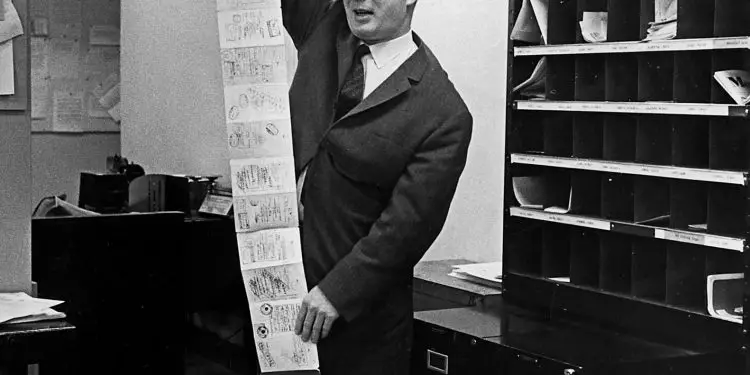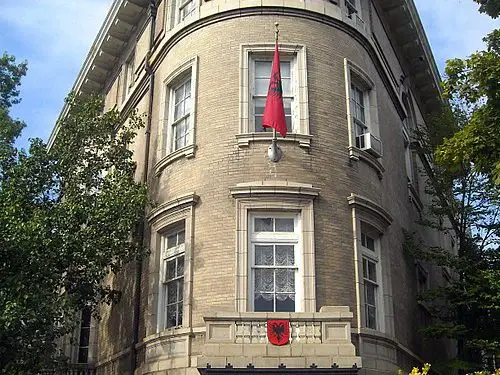By Albert Gjoka
David Binder: “Why did the Albanian-American talks fail in 1973 and why was my visa to Albania denied when Enver Hoxha was dying?!”
Memorie.al / “I waited 28 years to get a visa to set foot in Albania,” – this was the fate of David Binder, the renowned journalist of “The New York Times,” who, in an exclusive interview for “Albania,” talks about his 33-year career as a reporter covering Albania and the Eastern communist bloc in one of the most prestigious media outlets in the world. The journalist who saw the construction of the Berlin Wall with his own eyes in 1961, but who was also a witness to its fall and the overthrow of communism, recounts that he got his first information about Albania in the lecture halls of Harvard University.
In this interview, Binder reveals for the first time how he became acquainted with Albania; his continuous reporting about the isolated communist state, the rejection of our mission at the UN to meet with him during 1984, and finally, his meeting with our ambassador in Belgrade, Kujtim Hysenaj, who, after less than a decade, would become the head of the National Intelligence Service.
In the first part of this interview that we are publishing, Binder talks about the reasons that led to the failure of the talks for the restoration of diplomatic relations between Albania and the USA in 1973. “Perhaps it had to do with the heart attack that Enver Hoxha suffered,” – says the well-known Times journalist, multiple times a contender for the “Pulitzer,” one of the most prestigious awards in journalism worldwide.
Mr. Binder, when did you first hear about Albania? When did you start writing about this country?
I first learned about Albania while studying Balkan history with Professor Robert Lee Wolff at Harvard University. I began writing about this country in 1963 when I moved to Belgrade to work as a journalist for “The New York Times.”
At that time, was it very difficult to find information about Albania? What were the ways you used to gather data about this isolated communist state? What contacts did you have with Albanian institutions, the Albanian diplomatic mission around the world, and foreign diplomats in Tirana?
While I was staying in Belgrade, I listened to the English broadcast on “Radio Tirana.” I also read translations of the Albanian press and comments about Albania in the Yugoslav press. But, shortly before 1984, when I made a phone request to the Albanian mission at the United Nations for a meeting with the diplomatic representative, I received a blunt response: “You cannot speak to anyone, at any time.”
I visited the Albanian Embassy in Belgrade, starting in the summer of 1963, where I applied for a visa and persisted for 28 years. I finally received it in 1990 from Ambassador Kujtim Hysenaj, who was very intelligent and a pleasant man.
I tried to compensate for the insufficient knowledge of Albanians in their homeland by finding Albanians in the diaspora; such as Steven Peters from the American Department of State and Professor Arshi Pipa, whose works I read in English.
I read Albanian literature, finding it translated, including the prose and poetry of Ismail Kadare. In fact, I also tried to learn a little of the Albanian language.
I don’t know if you ever met Enver Hoxha?! How would you describe him as a leader? And if you were to compare him with other dictators in the East?
I have never met Enver Hoxha. But I think he was one of the vilest tyrants in contemporary history; as cruel as Hitler, Stalin, and Mao. He was as bad as Ceaușescu, Rakoshi, and Zhivkov; and in some aspects, worse than all of them. He had done a significant job by unifying the Albanian language (though at a heavy price for the Gegs).
You have written several articles stating that the United States invited Albania to establish diplomatic relations as early as 1973. Why did the negotiations fail?
The answer to this question exists in Tirana, not in Washington. Perhaps it had to do with the heart attack that Enver Hoxha suffered in 1973. But, I suspect it had more to do with Albania’s relations with China, which then began to cool.
How did you imagine Albania, and how did you see it when you first arrived here?
I knew it was poor, isolated, and economically backward, but, in reality, the situation was more shocking, including the mania for Enver Hoxha’s bunkers, similar to the Maginot Line of the war. (The defensive front of France against Germany during World War II – editor’s note).
The biggest surprise at the human level was that I discovered that most of the Albanians I met were highly educated people, well-informed about the world, about what was happening beyond their narrow borders, mainly through foreign radio and television.
Who is David Binder?
David Binder was born to American parents on February 22, 1931, in London. He graduated from Harvard University and then completed a course, receiving a degree in Arts, in European History and Literature in 1953. Binder was a Fulbright scholar at the University of Cologne in 1953-‘54. He also received a qualification at the Salzburg Seminar.
Binder is the author of the books; “Berlin East and West,” published in 1962, and “The Other German – The Life and Times of Willy Brandt” in 1976. He is also a co-author of publications from the “New York Times” on “Project Apollo” concerning the fall of communism. He worked until 1996 and has been retired since then.
David Binder’s Professional Career
David Binder was one of the journalists in the Washington Bureau of the “New York Times” from 1973 until he retired in 1996. He was the first as a diplomatic correspondent and later as a news editor, and again as a correspondent. He continued to work specializing in covering issues related to Eastern and Central Europe. Binder often traveled to these countries.
His previous assignments for the “Times” included: correspondent in Germany from 1967 to 1973, and correspondent for Eastern Europe, based in Belgrade, from 1963 to 1967. Earlier, he worked in Washington as a diplomatic correspondent and in Berlin, covering reports on the construction of the Berlin Wall in 1961.
In 1989 and 1990, he reported on the fall of the Wall and the overthrow of the communist system in East Germany, Romania, Bulgaria, Albania, and Yugoslavia. David Binder also reported on the civil wars in Croatia, Bosnia, and the conflict in Kosovo. In addition to the “New York Times,” since 1991, he has collaborated with many other American and British newspapers. Memorie.al
















